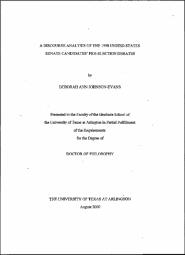
ATTENTION: The works hosted here are being migrated to a new repository that will consolidate resources, improve discoverability, and better show UTA's research impact on the global community. We will update authors as the migration progresses. Please see MavMatrix for more information.
Show simple item record
| dc.contributor.author | Johnson-Evans, Deborah Ann | |
| dc.date.accessioned | 2020-10-09T21:19:37Z | |
| dc.date.available | 2020-10-09T21:19:37Z | |
| dc.date.issued | 2000-08 | |
| dc.identifier.uri | http://hdl.handle.net/10106/29508 | |
| dc.description.abstract | Every two years, candidates for national-level public office participate in pre-election debates as part of their campaign. In debates, candidates attempt to distinguish themselves from their opponents and persuade the electorate to vote for them. Many researchers claim that debates are simple candidate performances orchestrated by the media, and discount the candidates' discourse as rehearsed sound bites and the candidates' interactions are simply “politics as usual.” The sense of being normal is what invites us to study the discourse that occurs in a situation imbued with the presentation of legitimated political power between individuals who seek legislative power. The present study examines the discourse of twenty senatorial candidates who participated in televised pre-election debates during the 1998 elections. Ten debates were selected, and transcribed, and each intonation unit produced by Democratic and Republican candidates was coded. The data were analyzed using tools of discourse and quantitative analysis for the purpose of ascertaining if certain discourse features systematically appear in candidates' discourse which distinguished incumbents from challengers, Democrats from Republicans, or female candidates from male candidates. The results of the analysis indicate that candidates have similar amounts of clause types, levels of embedding, and use most verb types in similar amounts and in similar ways. Five factors were found to correlate with winning candidates and several trends were identified in which discourse features correlate with the candidate's political party or gender. All candidates grammatically demote their opponents, place information about the issues in less prominent positions in their clauses, and attribute most of the action to themselves through direct action and mental cognition verbs. | en_US |
| dc.language.iso | en_US | en_US |
| dc.publisher | University of Texas at Arlington | en_US |
| dc.subject | Social sciences | en_US |
| dc.subject | Language | en_US |
| dc.subject | Literature and linguistics | en_US |
| dc.subject | Candidates | en_US |
| dc.subject | Debates | en_US |
| dc.subject | Discourse analysis | en_US |
| dc.subject | Senate | en_US |
| dc.subject | United States Senate | en_US |
| dc.title | A DISCOURSE ANALYSIS OF THE 1998 UNITED STATES SENATE CANDIDATES' PRE-ELECTION DEBATES | en_US |
| dc.type | Dissertation | en_US |
| thesis.degree.department | Humanities | |
| thesis.degree.name | Doctor of Philosophy in Humanities | |
Files in this item
- Name:
- A Discourse Analysis of the 1998 ...
- Size:
- 11.70Mb
- Format:
- PDF
- Description:
- PDF
This item appears in the following Collection(s)
Show simple item record


